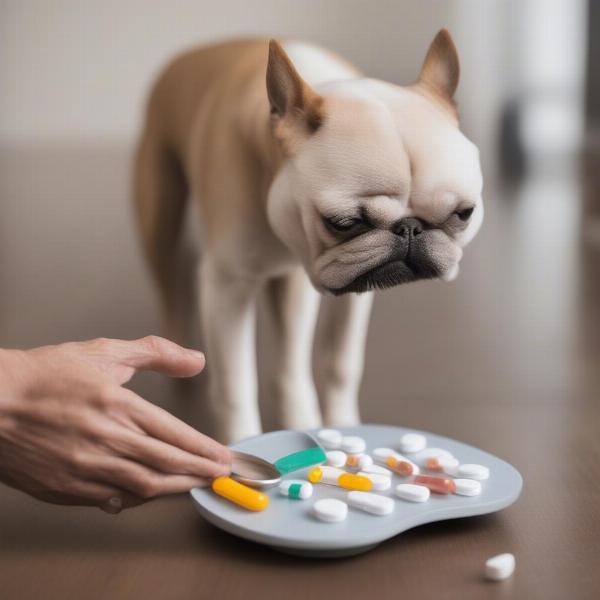Azo is a common over-the-counter medication used by humans to relieve UTI symptoms. However, you should never give your dog Azo or any other medication formulated for humans without explicit direction from a veterinarian. While Azo might seem like a quick fix for your dog’s discomfort, it can be harmful and even toxic to them. This article will explore why you shouldn’t give your dog Azo, the signs of UTIs in dogs, and the proper steps to take if you suspect your furry friend has a urinary tract infection.
Understanding Urinary Tract Infections (UTIs) in Dogs
Just like humans, dogs can develop UTIs. These infections occur when bacteria enter the urinary tract, causing inflammation and discomfort. Female dogs are more prone to UTIs than males due to their shorter urethra. Recognizing the signs of a UTI in your dog is crucial for prompt treatment.
Common Signs of a UTI in Dogs
Several symptoms can indicate a UTI in your dog. These include:
- Frequent urination
- Straining to urinate
- Accidents in the house
- Blood in the urine
- Licking the genital area excessively
- Whining or crying while urinating
- Cloudy or strong-smelling urine
- Lethargy or loss of appetite
If you notice any of these signs, it’s essential to consult your veterinarian immediately. They can diagnose the infection and prescribe the appropriate medication for your dog.
Why You Shouldn’t Give Your Dog Azo
Azo contains phenazopyridine hydrochloride, a pain reliever that works by acting directly on the urinary tract lining. This drug is not approved for use in animals. While it might provide temporary pain relief for humans, it can have adverse effects on dogs. Their bodies metabolize medications differently than ours, and giving them human medications can lead to serious complications, including kidney and liver damage.
Furthermore, Azo only masks the symptoms of a UTI; it doesn’t treat the underlying infection. Giving your dog Azo might delay proper diagnosis and treatment, allowing the infection to worsen and potentially spread to other parts of the urinary tract, including the kidneys.
What to Do if You Suspect Your Dog Has a UTI
The best course of action if you suspect your dog has a UTI is to schedule an appointment with your veterinarian. They will likely perform a urinalysis to confirm the diagnosis and identify the type of bacteria causing the infection. Based on the results, they will prescribe the appropriate antibiotics and possibly other medications to manage pain and inflammation.
Treating UTIs in Dogs: Veterinary Guidance is Key
Never attempt to self-treat your dog’s UTI. Follow your veterinarian’s instructions carefully and administer the prescribed medications for the entire duration, even if your dog’s symptoms improve. Stopping the medication prematurely can lead to antibiotic resistance and recurrent infections.
 Dog Taking Medication for UTI
Dog Taking Medication for UTI
“Always consult with your veterinarian before giving your dog any medication, even over-the-counter ones. What’s safe for humans isn’t necessarily safe for our furry friends,” advises Dr. Emily Carter, DVM, a veterinary specialist in small animal internal medicine.
“Early diagnosis and proper treatment are crucial for resolving UTIs in dogs and preventing potential complications. Don’t hesitate to contact your vet if you suspect your dog is showing signs of a UTI,” adds Dr. Michael Davies, DVM, a veterinary surgeon with over 15 years of experience.
Conclusion
While Azo might be a readily available option for humans suffering from UTIs, it’s crucial to remember that it’s not safe for dogs. Giving your dog human medications can have serious consequences. If you suspect your dog has a UTI, consult your veterinarian for proper diagnosis and treatment. They can provide the appropriate medication and guidance to ensure your furry friend’s quick recovery. Never give your dog Azo for a UTI.
FAQ
- Can I give my dog cranberry juice for a UTI? While cranberry juice is often recommended for humans with UTIs, its effectiveness in dogs hasn’t been scientifically proven. It’s best to consult your vet before giving it to your dog.
- How long does it take for a dog’s UTI to clear up with antibiotics? Most UTIs in dogs respond well to antibiotics within a week or two.
- Are there any home remedies for dog UTIs? No, there are no proven home remedies for dog UTIs. Always consult your veterinarian for proper treatment.
- Can UTIs in dogs be prevented? Ensuring your dog has access to fresh water and allowing them frequent opportunities to urinate can help prevent UTIs.
- Can stress cause UTIs in dogs? While stress doesn’t directly cause UTIs, it can weaken the immune system, making dogs more susceptible to infections.
- Are certain dog breeds more prone to UTIs? Some breeds, such as Cocker Spaniels and Miniature Schnauzers, are believed to be more prone to UTIs.
- What happens if a dog’s UTI is left untreated? Untreated UTIs can lead to more serious complications, such as kidney infections and bladder stones.
ILM Dog is a leading online resource for dog owners worldwide, offering expert advice and practical tips on all aspects of dog care, including breed selection, health, training, nutrition, grooming, and more. From puppy care to senior dog care, we’re here to help you provide the best possible life for your furry companion. For personalized advice and support, contact us at [email protected] or call +44 20-3965-8624. ILM Dog is dedicated to helping you navigate the joys and challenges of dog ownership, providing valuable information and resources every step of the way.